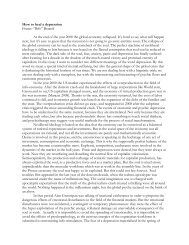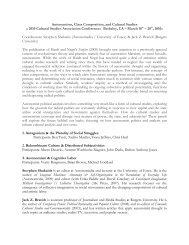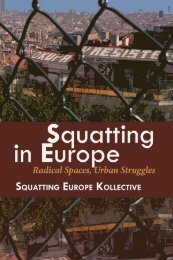nanopolitics handbook - Minor Compositions
nanopolitics handbook - Minor Compositions
nanopolitics handbook - Minor Compositions
You also want an ePaper? Increase the reach of your titles
YUMPU automatically turns print PDFs into web optimized ePapers that Google loves.
If we look for a slogan that can describe the practices of the movements ofrecent years, in North Africa, Wisconsin, the squares of Madrid, Athens, NewYork 47 we find and fall in love with ‘strike, occupy!’ This slogan stands for morethan a vague and rather undifferentiated notion of who we are (99%!), or ofwhat we are (outraged, indignados, workers, disaffected citizens) or of whatwe want (stop the cuts, real democracy etc.). It speaks to what we do (as does‘real democracy now!’), both as a mode of refusal, and as a mode of re-appropriation.It is tactical and strategic, and speaking to the immediate creation ofthe world we want: a world where we occupy the wealth and a world where wedo not have to give up our time and energy for a wage (and where we are notscrewed if we don’t or can’t). Occupation of a space – or liberation as the UKGaza solidarity movement taught us 48 – is never a mere act of being there todemonstrate our numbers and capacity to mobilize ourselves. It is the takingof a space against its owners and the state. But it is no passive occupancy, it isthe creation of a space and a time for encounters, for discussion and collectiveinvestigation into the crisis that is violently reshaping or destroying ourlives and hopes. 49 And it is always also the self-organisation of that space totry to make it defensible, safe, sustainable, capable of flowing beyond itself,into the neighbourhoods and workplaces. The perhaps most important practicallesson these struggles draw on and confirm is the importance of suchspaces of transversal self-organisation, in a situation in which past generations’institutions of politics are still more sclerotic, co-opted, or mere formsof the management of dissent. However, the rejection of unions and parties isno longer what it was when they were hegemonic forces; scepticism and theknowledge of their ambivalence is today accompanied with new experimentswith parties and institutions. The debate remains open and unresolved, forwhat it’s worth its clear that the movements in the current and past formsremain insufficient to what we want to do.The new movements have just begun to reinvent for a very different agewhat the early workers movement was before it was separated off from societyas a means to manage class antagonism. At a time of proletarian non-reproduction,i.e. insufficient social and work wages, mutual aid, not-for-profit culturalactivities, sharing and community organising again become important. 50 Suchspaces also have their own temporalities and modes of being and doing together,they give us a politics that goes beyond the professionalised and subculturalmodes of organisation based on meetings and friendship or membership. Inso far as these are spaces of sharing and commoning (with its people’s kitchens,support networks and assemblies), and in so far as they are in antagonisticmovement, becoming generalised against the powers of state and capital (‘abolishing/sublatingthe present state of things’), we can speak of minor, perhaps215










